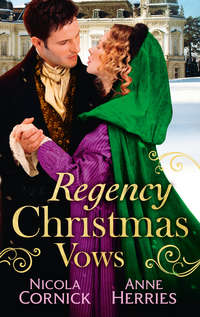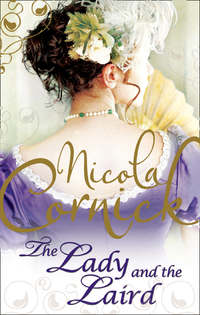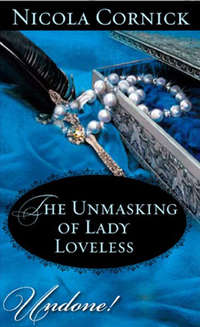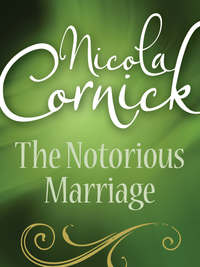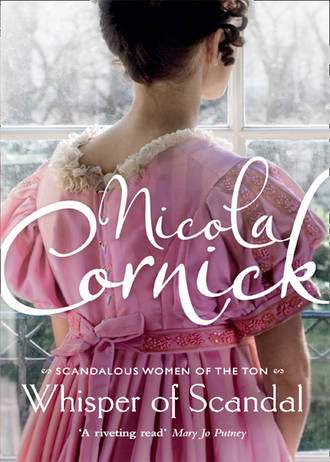
Полная версия
Whisper of Scandal
“You cannot do that—”
“I can.” He was easing her back down amongst the smashed meringues and scattered strawberries, leaning over to kiss her even as he threw up her petticoats, spread her wider and worked that wicked sword hilt inside her. He tasted of champagne and strawberries. She could feel the ice melting against her inner thighs, running in rivulets down her skin even as the heat inside her blazed to impossible levels. She arched upward and came in one huge, overwhelming roll of sensation, biting down on one of her embroidered napkins to prevent herself from screaming loud enough to wake the whole house.
When she came to her senses she realized that there was fruit in her hair and she was lying half-naked in a pool of melted ice. Dev was laughing down at her. In the half light he looked young and vital and very, very wicked. Lottie’s heart skipped a beat.
“You enjoyed that?”
“Oh, you.” Lottie was disconcerted to realize that she felt rather more for him than simple gratitude. She struggled to push aside some unfamiliar emotions and achieve her customary languor.
“Well, darling,” she murmured, “what a find you have proved to be!” She reached for him and was gratified to discover that he was very hard for her.
“Not here,” he said, scooping her up into his arms with an ease that was very seductive. “What do you say to a tryst in the gardens?”
“The summerhouse is nice at this time of year,” Lottie murmured as he strode toward the door leading out to the terrace. “Actually, I find that the summerhouse is nice at any time of year.”
ALEX GRANT SAT IN THE OFFICES of Churchward and Churchward, lawyers to the aristocratic and discerning, in High Holborn, and tried not to feel too impatient. This had most decidedly not been part of his plan. Since he was still kicking his heels in London waiting for his next commission from the Admiralty, he had decided to ignore all the tempting offers from the ton to grace their social events and to spend the day visiting a former colleague at the naval hospital at Greenwich. But when he had arisen that morning, his steward, Frazer, had told him glumly that not only were there no orders but there was an urgent letter from the lawyers-and true enough, when he opened Mr. Churchward’s missive that gentleman’s agitation had leaped from the page, summoning him immediately to a meeting in his chambers.
Now he was here, though, Mr. Churchward was remaining obstinately silent, for Lady Joanna Ware had not yet arrived and it would be quite improper, so Mr. Churchward said, for him to acquaint Lord Grant with the nature of the problem until her ladyship was present.
Alex drummed his fingers impatiently on the table beside him. His leg was aching today, the result no doubt of his exertions in Mrs. Cummings’s ballroom the previous night. It put him in an intolerant mood. There was no sound in Mr. Churchward’s office but for the rustle of papers, the muted rumble of traffic in the street below and the tick of the clock as it marked just how long Lady Joanna was keeping them waiting.
Alex had not intended to see Lady Joanna Ware again before he left London and the fact that he was now obliged to do so-or would be if she ever arrived-was sufficient to annoy him intensely. It was not, he assured himself, that he could not accept his congé. It was true that Lady Joanna had dismissed him the previous night in a manner that was fully as public and embarrassing as she had promised, but he was man enough to take that. She had given him fair warning, he had underestimated her and he had been bested. No, what troubled him was the matter of David Ware’s last words.
Alex had never questioned his late colleague’s integrity before and it disturbed him to find himself doing so now, particularly as he had no reason to doubt Ware’s embittered words about his wife. And yet. And yet Joanna Ware’s pale stricken face was before his eyes and remembering her expression made him feel as though he had been kicked squarely in the gut.
“You assume that I am the one who was in the wrong … I am sorry you believe that.”
He had felt her pain then. He had not wanted to; he had no desire to be moved by this woman or to feel any affinity for her and yet he had not been able to help himself.
It was easy to canonize a man after his death, especially a man like David Ware, who had already been hailed as a hero. Joanna must have been a very pretty adornment to Ware’s fame, burnishing his glory with her elegance and style. But then something must have happened; everything had gone wrong between them.
“You assume that I am the one who was in the wrong …”
Somewhere in the recesses of Alex’s body he felt a wayward pang of sympathy for Joanna Ware. And yet his doubts lingered. On his deathbed Ware had called his wife a deceitful, manipulative bitch, harsh words, bitterly spoken. There had to be a reason.
Impatiently Alex dismissed his thoughts. He was not at all sure why he was expending so much time in thinking about Joanna Ware. It was infuriating and completely unacceptable that he felt drawn to her in some odd way in direct contradiction to what they both wanted. Yet he could not shift the feeling. It persisted. It made him angry and uncomfortable. He also profoundly disliked being dragged into David Ware’s personal affairs. When he had delivered his late colleague’s letter to the lawyers, he had thought that was an end to the matter and yet here he was; against his will he had been drawn further into Ware’s business.
He itched to be gone.
There was a flurry of noise outside the door and then the clerk threw it open with a somewhat theatrical flourish and Lady Joanna Ware swept into the room. Alex got to his feet. Mr Churchward leaped up, too, apparently so eager to greet his client that he managed to knock a pile of papers off his desk.
“My lady!” Churchward looked momentarily stunned and Alex knew how he felt. Joanna’s entrance had brought something bright and vital into the fusty room, chasing away the cobwebs and the shadows. For a moment Alex felt dazzled, as though he was looking directly into the sun. It was odd, he thought, for his overriding impression of Joanna had from the start been one of cool superficiality and self-containment and yet now she was all warmth and charm. It was like watching a different woman. She was shaking Mr Churchward’s hand and smiling in genuine pleasure to see the lawyer and her brittle façade was quite gone, replaced by a sincerity that seemed entirely genuine.
This morning Joanna was dressed in a primrose silk morning gown with a matching spencer trimmed with black lace. A delicious little hat sat on her upswept chestnut curls. She looked breathtakingly pretty, very young and disconcertingly innocent. It was a smart, stylish, expensive outfit, neat as a pin and yet somehow subtly seductive. Alex, unversed and uninterested in fashion, had not the least idea why the sight of so apparently respectable a gown should have precisely the reverse effect on him and make him feel distinctly unrespectable. It covered all of Joanna from neck to toe and it made him want to uncover her, preferably immediately and in intensive detail. He shifted slightly.
“I am surprised to see that your dog can move,” he said as the terrier trotted into the office in Joanna’s wake, the yellow ribbon in its topknot complementing her yellow silk perfectly. “I hope he has not found the exercise of walking from your carriage too onerous.”
Joanna turned. Her violet-blue eyes fixed on Alex and she did not look pleased to see him. Her luscious mouth tightened into a deeply disapproving bow, which contrarily Alex found extremely attractive.
“My dog’s name is Max,” she said, “and he is a border terrier and as such perfectly capable of vigorous activity. He simply chooses not to exert himself.” The dog, as though to make the point, graciously accepted a biscuit Mr. Churchward had taken from his drawer, curled up neatly in a patch of sunlight on the floor and went to sleep.
“Mr. Churchward did not tell me that you would be here,” Joanna added. “I was not expecting to see you.”
“I was not expecting to be here,” Alex said as he held her chair for her. “So both of us are disappointed.” He shrugged, turning to the lawyer. “As Lady Joanna has finally deigned to grace us with her presence,” he said, “shall we commence?”
“Thank you, my lord,” Mr. Churchward said frostily. He fidgeted a little with his papers and settled his glasses more firmly on his nose. “Madam.” His voice quivered a little and Alex realized that he was laboring under a strong emotion, “may I first say how sorry, how very sorry I am to be the bearer of yet more bad news in relation to your husband’s death. When we met a year ago to discuss the distressing terms of his will—” He broke off and shook his head. “It pains me greatly,” he added, “to bring yet more trouble upon you.”
“Dear Mr. Churchward—” there was more warmth in Joanna’s tone than Alex had ever heard from her before “—I fear you are making me nervous!” She smiled reassuringly at the lawyer though Alex thought there was an edge of anxiety beneath her assumption of ease. “You cannot be held responsible in any way for my late husband’s behavior,” Joanna said. “Pray do not concern yourself.”
Looking from Joanna’s composed features to Mr. Churchward’s anguished ones, Alex wondered for the first time about the depositions of David Ware’s will and about the codicil, that very document that he had carried back all the way from the Arctic at Ware’s behest. He had assumed that his late comrade had left his not-inconsiderable fortune to Lady Joanna to allow her to continue to live in the lavish style to which she was clearly accustomed. That would surely have been in keeping with Ware’s character, with his honor and his sense of duty. But now, looking at the lawyer’s gloomy face-and remembering Ware’s venom toward his wife-Alex realized that his assumption might well have been false.
“What were the terms of Ware’s will?” he interrupted.
Both Joanna and the lawyer jumped as though they had forgotten he was there. Joanna refused to meet his eyes, smoothing the material of her skirts in a quick, fidgety gesture. Churchward flushed.
“My lord, I beg your pardon, but I am not certain that it is your business.”
Joanna looked up suddenly and Alex felt the impact of her gaze like a physical blow, it was so keen and clear.
“On the contrary, Mr. Churchward,” she said, “I imagine that Lord Grant is here because David has somehow embroiled him in my affairs. If that is the case then he deserves to know the truth from the beginning.”
“If you wish, madam.” Churchward sounded huffy. “It is most irregular, however.”
“David,” Joanna said gently, “was irregular, Mr. Churchward.” She glanced back at Alex, took a deep breath and seemed to be choosing her words with some care. “My late husband,” she said, “left his estate to his cousin John Hagan in his will and cut me off without a penny.” She paused. “You may be aware, Lord Grant, that Maybole was bought with David’s navy prize money?” She waited and Alex nodded. David Ware, as a younger son, had not inherited an entailed estate. He had bought a piece of land at Maybole in Kent and had built a gaudy mansion in which Alex had been just the once.
“His arrangements,” Joanna continued, “left me somewhat financially embarrassed.” Once again she dropped her gaze and smoothed some imaginary crease from the pristine folds of her skirts.
“He did not explain his actions to me,” she finished, “but no doubt he had his reasons.”
“No doubt he did,” Alex said. He was shocked and puzzled that his late colleague had been so ungallant as to leave his wife penniless. It seemed quite out of character, but then had Ware not implied that he had good reason to mistrust his wife? Presumably he had done the minimum for her that he was required to do under the law.
“In my experience Ware was a good judge of character and never acted without just cause,” he said stiffly. “The provocation must have been considerable.”
He saw the angry color mantle Joanna’s cheeks. “Thank you for your unsolicited opinion,” she said coldly. “I might have known that you would take his part on the basis of no evidence whatsoever.”
“It was unforgivable of Commodore Ware to make so little provision for Lady Joanna,” Churchward muttered. The lawyer, Alex was interested to see, made no attempt at impartiality. “It was not the action of a hero.”
Mr. Churchward, Alex thought, was a man who approved of things being done in the proper way and David Ware had apparently transgressed that code in failing to provide sufficiently for his wife.
“Surely you had a jointure, Lady Joanna,” he said abruptly. “I cannot believe Ware left you utterly destitute.”
There was a small silence. Joanna bit her lip. “David did leave me a small sum of money, it is true …”
Alex felt a rush of relief that his faith in his late friend had not been misplaced. He could see clearly enough what must have happened. Ware had left his wife a perfectly adequate settlement but she was so spendthrift and careless that it was never enough.
“I suppose that it is a sum that you easily outrun with your extravagance?” he said. He allowed his gaze to sweep over Joanna and did not hide his scorn. “I can well imagine that you are expensive to run.”
“I am not a carriage,” Joanna said haughtily. “And yes—” she smoothed the skirts of her yellow silk “—I appreciate fine things—”
“Then you have only yourself to blame,” Alex said. “It is a simple matter of economics. If you do not possess the money in the first place, don’t spend it.”
“Thank you for the lesson,” Joanna snapped. There was a slight flush in her cheeks now, but the sparkle in her eyes was anger not embarrassment.
“Last night,” she said, “you did not scruple to point out to me that David hated me, Lord Grant.” She made a slight gesture. “You will be pleased that there is evidence to support your assertion.”
Alex saw Churchward stiffen with outrage. The lawyer, he thought with amusement, was looking as though he would like to run him through-if such martial thoughts ever occurred to a peaceful man of the pen.
“My lord!” Churchward sounded reproachful. “How very ungallant of you to suggest such a thing.”
“But true,” Joanna said smoothly. “David hated me and through various ingenious means sought to punish me, even after he was dead. Clearly he was every bit as resourceful as everyone claimed him to be.” She sighed. “Anyway, we must let that go and turn to the current matter.”
“A moment.” Alex held up a hand. He was thinking of the beautiful house in Half Moon Street and the attractive and expensive items with which Lady Joanna Ware surrounded herself. He wondered who was paying for them if her jointure really was as minuscule as she claimed. David Ware’s close relatives were dead and Alex had the impression that Joanna herself, whilst an Earl’s daughter, had come from a relatively impoverished country family. If Ware had left her practically without a feather to fly then her comparative wealth was curious, to say the least.
“If you inherited little of Ware’s fortune and the bulk of it went to John Hagan,” he said slowly, “how are you funded?”
He heard Mr. Churchward give a snort of disgust. The lawyer, like Lady Joanna herself, had picked up on the implications of his question:
“Who is supporting you? Is it a lover?”
Lady Joanna raised her brows; a smile curved her delectable mouth.
“I thought that they taught manners at the naval academy, Lord Grant,” she said. “Did you play truant for those lectures?”
“I find it easier to ask a direct question when I want a straight answer,” Alex said.
“Well, you are not barking questions at your men now,” Joanna said. She lifted one slim shoulder in an elegant shrug. “Nevertheless, I will answer your question.” Her tone was cold now. “The house in Half Moon Street belongs to Mr. Hagan. As for the rest-prepare yourself for a shock.” Her violet-blue eyes mocked him. “I hope that you are strong enough to withstand it, Lord Grant.” She paused. “I work for my living.”
“You work?” Alex was shocked. “As what?” He made no attempt to erase the incredulity from his tone.
Joanna laughed. “Certainly not as a courtesan—” her tone was derisory “—in case you thought that the only talent I might have to offer.”
“As to that,” Alex said, holding her eyes, “I really would not know if it is one of your talents.” He paused. “Would I?”
Her eyes flashed, smoky with dislike. “Nor will you.”
“My lord, my lady!” Mr. Churchward intervened. The tips of his ears glowed bright red. “If you please.”
Joanna dropped her gaze. “People pay me to design the interior of their homes, Lord Grant. I am considered to have excellent taste, sufficient that people wish to buy it for themselves. They pay me well and a few years ago I was also fortunate enough to inherit a legacy from my aunt.” She shifted in her seat, glancing again at Mr. Churchward, who was looking most uncomfortable. “But we wander from the point. Mr. Churchward has more bad news to impart, I believe. Let us put him out of his misery.”
“Thank you, my lady,” Churchward said unhappily. He placed the letter Alex had delivered two days before on the top of his desk and smoothed it as though in doing so he could somehow alter the content.
“Lord Grant delivered this letter to me on behalf of your husband,” he said to Joanna. “It is a codicil to his will.”
“David entrusted it to me when he was dying,” Alex added.
Joanna looked at him thoughtfully. He could not read her expression now. Those violet eyes were guarded. “Another of David’s melodramatic deathbed gestures,” she said. “You did not mention this when you called on me, Lord Grant.”
“No,” Alex said, “I did not. I had no idea if the contents were relevant to you or not.”
He saw her lashes come down, veiling her expression still further. Only the tattoo beaten by her fingers on the desk suggested she was in any way discomposed. He knew what she was thinking, though. He could read her as clearly as if she had spoken. She thought him David’s pawn; that his loyalty to her late husband had enabled Ware to use him. Alex found that he did not like to be judged that way, as though he had no independent thought. Then he recognized with grim irony that he had judged Joanna Ware, too. Not on his experience of her but on Ware’s word alone. The tension thickened, the atmosphere in the room feeling prickly with antagonism.
“Please proceed, Mr. Churchward,” Joanna said politely.
Churchward cleared his throat. “‘Written in my own hand, by Commodore David Ware on the seventh of November in the year nine.’” He looked at them over his glasses.
“‘I have decided that I have been remiss,’” he read aloud, “‘in leaving so little in my last will and testament to my wife, Lady Joanna Caroline Ware. I am aware that various parties might criticize my neglect of her, so I hereby redress the balance in this codicil to my will.’”
Alex looked at Joanna. She did not look like a woman eagerly anticipating a hitherto-unexpected windfall. Her expression was that of someone expecting a very nasty surprise.
“‘I leave to Lady Joanna’s care and welfare-’” Mr. Churchward paused and swallowed so hard that his Adam’s apple bobbed “‘-my baby daughter, Nina Tatiana Ware.’”
Alex felt a short, sharp jolt of shock. He had known that Ware had taken a Russian mistress during their last expedition to the Arctic. Ware’s association with the girl had been no secret; he had boasted of it, claiming that she was Pomor nobility even if he had found her in a whorehouse. Ware’s men had joked about their captain’s promiscuity and the fact that even on a trip where women were few and far between, he had found both time and opportunity for his whoring. Alex had thought that the girl had left Spitsbergen for the Russian mainland. But Ware had never mentioned a child before. Alex could only assume that approaching death had shaken his colleague into taking some action toward his bastard daughter.
Churchward’s words reclaimed his attention. “‘Nina is currently four years old and an orphan resident in the monastery at Bellsund, in Arctic Spitsbergen.’” The lawyer’s voice wobbled. “‘I know my wife will be delighted at this proof of my fecundity.’” Churchward’s voice dwindled and died away. Looking at Joanna, Alex could see that she had turned chalk white, her eyes vivid in a parchment-pale face. “Madam—” Churchward said helplessly.
“Pray proceed, Mr. Churchward,” Joanna said again. Her voice was quite steady.
“‘There are two conditions contingent on this legacy,’” Churchward read. “‘Firstly that my wife must travel in person to the Bellsund Monastery in Spitsbergen where my daughter is currently being cared for, and bring her back to London to live with her.’” Mr. Churchward’s voice was getting faster and faster as though by hurrying over the words he could somehow lessen their impact. He shot both Joanna and Alex a hunted glance like a rabbit trapped in the poacher’s sights. “‘I am aware,’” he continued, the letter shaking now in his hand, “‘that Joanna will detest the strictures that I have placed upon her, but that her desire for a child is so strong she will have no choice other than to put herself into the greatest danger and discomfort imaginable in order to rescue my daughter-’”
He stopped as Joanna took a sharp breath. “Madam—” he said again.
Joanna had turned even paler, so deathly white that Alex thought she might faint. “He abandoned a baby girl in a monastery,” she whispered. “How could he do such a thing?”
Alex got up and threw open the door into the outer office, calling for a glass of water. One of the clerks scurried away to fetch it.
“Fresh air,” Churchward said, pushing open the window and causing a draft to blow in that scattered the papers on his desk, “burnt feathers, sal volatile—”
“Brandy,” Alex said grimly, “would be more effective.”
“I do not keep spirits in my place of work,” Churchward said.
“I would have thought that you would need them sometimes,” Alex said, “for the benefit of both yourself and your clients, Mr. Churchward.”
“I am perfectly all right,” Joanna interposed. She was sitting upright, still very pale but with a dignity drawn about her now like a cloak. Alex pressed the glass of water into her hand, holding it steady with his hand clasped about hers. She raised her eyes thoughtfully to his face before she drank obediently. A shade of color came back into her cheeks.
“So,” she said after a moment, “my late husband manages to manipulate me from beyond the grave. It is quite an achievement.” She met Alex’s gaze. “Were you aware that David had an illegitimate daughter, Lord Grant?” She placed the glass gently on the table.
“No,” Alex said. “I knew that he had a mistress but not that the woman bore him a child. She was a Russian girl who claimed she was Pomor nobility. I thought she had returned to the mainland, but she must have died shortly before Ware if the baby is now an orphan.”
Joanna’s gaze was cloudy and disillusioned. “A Russian noblewoman,” she said slowly. “David would have loved that. How that would have enhanced his prestige!”
“The girl was young,” Alex said, “and wild. Her family had cast her out, washed their hands of her, I believe.” He looked at Joanna’s tight expression and felt something shift inside him. “I am sorry,” he said. He realized that he meant it. Whatever his opinion of Joanna Ware, he knew that this must be an immensely difficult issue for her to confront. He had to reluctantly admire her unflinching acceptance when most women would be having the vapors to have been bequeathed their husband’s bastard child.
“I am not naive enough to think that David was not capable of such a thing,” Joanna said slowly. “Indeed, perhaps I should be grateful that there are not more of his offspring scattered about the globe, or at least not as far as I am aware.” She looked at him. “Are you aware of any more of his sideslips, Lord Grant?”




